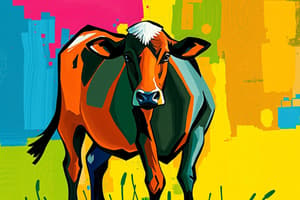Podcast
Questions and Answers
Which of the following is NOT a core component within the Microeconomics section?
Which of the following is NOT a core component within the Microeconomics section?
- Cost of production
- Market Structures (correct)
- Diminishing returns
- Production and Cost
Which concept is primarily associated with the law of diminishing returns in agriculture?
Which concept is primarily associated with the law of diminishing returns in agriculture?
- Maximizing production output
- Stable production levels
- Increasing cost of inputs
- Declining additional output (correct)
What is the weight percentage for the topic of Costs of Production in the specifications?
What is the weight percentage for the topic of Costs of Production in the specifications?
- 2.5%
- 2.00%
- 0.835%
- 5.03% (correct)
In the context of agricultural economics, which is an example of a short-run condition?
In the context of agricultural economics, which is an example of a short-run condition?
Which of the following is a method to differentiate between short run and long run conditions?
Which of the following is a method to differentiate between short run and long run conditions?
Which approach involves the measurement of income derived from production?
Which approach involves the measurement of income derived from production?
Which function indicates how households will allocate their income towards saving and consumption?
Which function indicates how households will allocate their income towards saving and consumption?
What is a likely consequence of high unemployment rates in an economy?
What is a likely consequence of high unemployment rates in an economy?
What distinguishes monetary policy from fiscal policy?
What distinguishes monetary policy from fiscal policy?
Which of the following measures is commonly used to counteract inflation?
Which of the following measures is commonly used to counteract inflation?
What term best defines the role of banks in the economy?
What term best defines the role of banks in the economy?
Which of the following best describes the consumption function?
Which of the following best describes the consumption function?
What does the term 'money supply' refer to in an economy?
What does the term 'money supply' refer to in an economy?
What is a main goal of fiscal policy?
What is a main goal of fiscal policy?
Which marketing function focuses on preparing products for sale and ensuring they meet quality standards?
Which marketing function focuses on preparing products for sale and ensuring they meet quality standards?
What factor is primarily associated with the demand for money?
What factor is primarily associated with the demand for money?
What is the primary benefit of effective market intelligence in agricultural marketing?
What is the primary benefit of effective market intelligence in agricultural marketing?
How do marketing margins influence the efficiency of the agricultural marketing system?
How do marketing margins influence the efficiency of the agricultural marketing system?
Which of the following is NOT a key function in agricultural marketing?
Which of the following is NOT a key function in agricultural marketing?
What role does packaging play in agricultural marketing?
What role does packaging play in agricultural marketing?
What is one of the primary aims of sustainable development?
What is one of the primary aims of sustainable development?
Which type of trade barrier includes tariffs?
Which type of trade barrier includes tariffs?
What aspect of economic integration does GATT-WTO primarily address?
What aspect of economic integration does GATT-WTO primarily address?
What is primarily analyzed when determining the balance of payments?
What is primarily analyzed when determining the balance of payments?
Which of the following is NOT a strategy for promoting economic growth?
Which of the following is NOT a strategy for promoting economic growth?
What is the primary function of foreign exchange in the balance of payments?
What is the primary function of foreign exchange in the balance of payments?
Which of the following is an example of a non-tariff barrier to trade?
Which of the following is an example of a non-tariff barrier to trade?
What characterizes extensive agriculture?
What characterizes extensive agriculture?
Which of the following is an essential component of agricultural development policies?
Which of the following is an essential component of agricultural development policies?
What is a primary focus of policies aimed at economic development?
What is a primary focus of policies aimed at economic development?
What is the primary distinction between a change in quantity demanded and a change in demand?
What is the primary distinction between a change in quantity demanded and a change in demand?
Which of the following factors is NOT considered a determinant of demand?
Which of the following factors is NOT considered a determinant of demand?
What effect does an increase in price typically have on quantity supplied?
What effect does an increase in price typically have on quantity supplied?
How does the law of diminishing marginal utility affect consumer choices?
How does the law of diminishing marginal utility affect consumer choices?
In the context of government policies aimed at increasing farmer's income, which elasticity factor should be prioritized?
In the context of government policies aimed at increasing farmer's income, which elasticity factor should be prioritized?
In imperfectly competitive markets, which factor primarily influences price determination?
In imperfectly competitive markets, which factor primarily influences price determination?
Which of the following best describes the concept of supply?
Which of the following best describes the concept of supply?
Which of the following is NOT a type of elasticity discussed in demand and supply analysis?
Which of the following is NOT a type of elasticity discussed in demand and supply analysis?
What is the primary effect of a subsidy on the supply curve?
What is the primary effect of a subsidy on the supply curve?
What role do consumer expectations play in determining demand?
What role do consumer expectations play in determining demand?
Study Notes
Introduction to Agricultural Economics and Marketing
- Agricultural economics is the study of how people use resources to produce and consume agricultural products.
- Major fields in agricultural economics include: production, resource management, marketing, trade, and development.
- Agricultural economics focuses on how individuals, firms, and governments make decisions about agricultural production, consumption, and resource allocation.
- Key economic ideologies of nations include: capitalism, socialism, and mixed economies.
Microeconomics
- Production and Costs:
- The production function explains the relationship between inputs used in production and the outputs obtained.
- The law of diminishing marginal returns states that as you add more of one input, holding other inputs constant, the level of output will eventually increase at a decreasing rate.
- Costs of Production:
- Factors of production include land, labor, capital, and management.
- The short-run in economics refers to a period where at least one factor of production is fixed, while the long-run allows all factors to change.
- Demand:
- Demand refers to the quantity of a good or service that consumers are willing and able to buy at a given price.
- Demand determinants: price, consumer income, tastes and preferences, prices of related goods, and consumer expectations.
- Change in quantity demanded is a movement along the demand curve due to price changes; a change in demand shifts the entire demand curve.
- Supply:
- Supply refers to the quantity of a good or service that producers are willing and able to sell at a given price.
- Supply determinants: price of inputs, technology, government policies, prices of related goods, and producer expectations.
- Change in quantity supplied is a movement along the supply curve due to price changes; a change in supply shifts the entire supply curve.
- Elasticity:
- Elasticity measures the responsiveness of one variable to changes in another, like the responsiveness of demand to price changes.
- Analyzing elasticity helps determine how government policies/programs impact farmers' income.
- Price and Output Determination:
- The interaction of supply and demand determines the equilibrium price and quantity in a market.
- Imperfectly competitive markets exist when there are few firms, differentiated products, and barriers to entry.
- Consumption:
- Consumer behavior is influenced by factors like income, preferences, and the desire to maximize utility.
- The law of diminishing marginal utility states that as you consume more of a good, the additional satisfaction you get from each additional unit decreases.
Macroeconomics
- National Income Accounting:
- Measures the total economic activity within a country, including GDP and GNP.
- Consumption, Savings, and Investment:
- Consumption is spending on goods and services by households.
- Savings are portion of income not spent on consumption.
- Investment is spending by businesses on new capital goods.
- Unemployment and Inflation:
- Unemployment occurs when individuals are actively seeking work but unable to find it.
- Inflation is a general increase in the price level of goods and services over time.
- Understanding the causes and effects of unemployment and inflation is crucial to address them through economic policies.
- Monetary and Fiscal Policy:
- Monetary policy refers to actions taken by the central bank to manipulate interest rates and money supply.
- Fiscal policy refers to government actions related to taxes and spending to influence the economy.
- Money and Banking:
- Money serves as a medium of exchange, a unit of account, and a store of value.
- Banking plays a critical role in creation and distribution of money supply within an economy.
Agriculture and Economic Growth
- Definition of Terms:
- Agriculture encompasses the cultivation of plants and raising of animals for human use.
- Sustainable development emphasizes economic growth without compromising future generations' ability to meet their needs.
- Economic growth is an increase in a country's production of goods and services over time.
- Economic development involves improvements in living standards, quality of life, and human well-being.
- Strategies for promoting economic growth include: investment in education and infrastructure, technological innovation, and efficient resource allocation.
- Policies and programs for agricultural development strive to increase productivity, improve rural livelihoods, and enhance food security.
- International Economics:
- Free trade allows countries to specialize in producing goods and services they are most efficient at, benefiting from international trade.
- Barriers to trade (tariffs and non-tariff measures) can negatively impact agricultural sectors.
- Global trade agreements like GATT-WTO aim to reduce trade barriers and promote economic integration.
- International organizations influence agricultural trade and development policies globally.
Agricultural Marketing
- Introduction:
- Agricultural marketing focuses on the processes involved in moving agricultural products from the farm to the consumer.
- It includes production, processing, distribution, pricing, and consumption stages.
- Marketing functions: transportation, storage, grading and standardization, packaging and labeling, and market intelligence.
- Marketing Margin and Cost:
- The marketing margin represents the difference between the price paid by consumers and the price received by producers.
- Marketing costs can impact the competitiveness of agricultural products.
- Market Structures and Pricing:
- Market structures include perfect competition, monopolistic competition, oligopoly, and monopoly.
- Different market structures impact pricing, supply chains, and market power.
- Government Intervention in Markets:
- Governments can intervene in agricultural markets to protect producers, stabilize prices, and ensure food security.
- Policies such as price supports, subsidies, and production controls can impact market dynamics.
- Marketing Channels and Supply Chains:
- Agricultural products flow through various channels from farms to consumers.
- Supply chains involve multiple actors who contribute to the value chain.
- Understanding the characteristics of different channels and chains is essential for effective marketing strategies.
Studying That Suits You
Use AI to generate personalized quizzes and flashcards to suit your learning preferences.
Related Documents
Description
This quiz covers key concepts in agricultural economics and marketing. It explores the various fields within agricultural economics, including production, resource management, and marketing. Additionally, it delves into foundational microeconomic principles related to production functions and costs.




